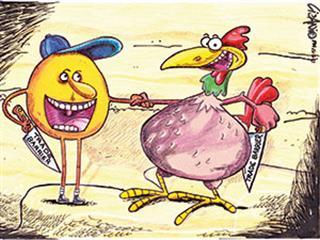
Organised food fights date back to medieval times. One of the oldest, the festival of the Battle of the Oranges in the northern Italian city of Ivrea, commemorates the city’s defiance against a tyrannical ruler. Fast-forward nine centuries and we’re still witnessing fights about food. In South Africa, it’s chicken, frozen potato chips and cheese that are on the international trade dispute agenda. If basic economics tells us that trade between nations provides real benefits to citizens, what do these disputes tell us about the current state of international trade?
Friction
Trade disputes are often exacerbated by cyclical downturns in economic activity. Yet The Economist (16 March, 2013) has said that “protectionism has been largely held at bay throughout the economic crisis”. This echoes the view of Pascal Lamy, director-general of the World Trade Organisation (WTO), who remarked last year that the use of trade defence measures by the WTO’s 157 members, specifically anti-dumping investigations, had declined between 2008 and 2011.
Anti-dumping investigations are a useful barometer of international trade friction because investigations are conducted around the globe and their effect on trade can be readily measured. (Anti-dumping investigations are admin-istrative proceedings that investigate allegations of unfairly low-priced imports that cause commercial harm to the importing country’s domestic producers).
South Africa launched its first investigation in the early 1920s. Between 1995 and 2010, SA conducted 222 investigations, making it the fifth most prolific user after India (613), the US (442), the European Union (414) and Argentina (277).
What makes anti-dumping investigations especially contentious is that there are only two possible outcomes: imposing or not imposing an import duty.
Either result affects business interests and trade flow. Unsurprisingly, opposing parties often hurl accusations and threats of legal action at each other and the investigating authority. In the recent investigation of chicken imports from Brazil, domestic producers questioned why the government had allowed imports to devastate SA’s poultry industry, while importers blamed SA producers’ business failings and lower quality products for what they claimed was a modest level of imports. Brazil meanwhile challenged SA’s action at the WTO. The dispute ceased only after the import duties were removed.
Downturn driving trend
The current state of international trade is a little less rosy than that suggested by The Economist’s comments. Although the number of anti-dumping investigations declined from 2008 to 2011, the duties imposed as a result of these investigations have tended to remain in place for longer. There has also been an increase in anti-dumping investigations since 2012.
The lingering economic downturn sparked by the financial crisis of 2008 is probably the biggest driver behind this trend. Businesses in South Africa and abroad have had to struggle with diminished economic activity as well as with foreign companies aggressively seeking new markets.
Investigations
Could current economic conditions lead to a tsunami of anti-dumping investigations? Having been involved in anti-dumping investigations for nearly two decades, I think it unlikely. National investigating authorities must play by defined rules requiring extensive fact-based investigations. Results can be challenged in domestic courts or internationally at the WTO.
Although the pace of anti-dumping investigations may increase in the short term, the number of investigations will probably return to pre-2012 levels with sustained economic growth.
Alexander Amrein is senior manager of policy and research at the International Trade Administration Commission of South Africa. He writes in his personal capacity. Contact him on 012 394 3688.
The views expressed in our weekly opinion piece do not necessarily reflect those of Farmer’s Weekly.











